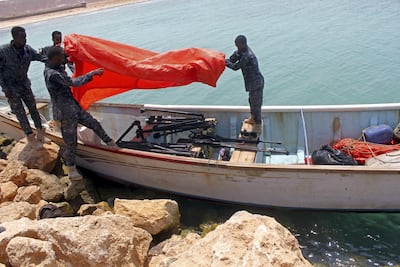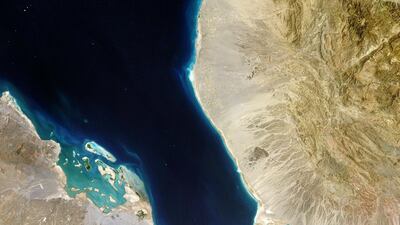Naval forces have demarcated a corridor in the Gulf of Aden and Bab el Mandab that warships will police to allow merchant ships safe passage from high speed boats laden with explosives, a spillover from the conflict in Yemen, and pirates.
The Combined Maritime Forces, a 32-nation multi-national naval force, said it will focus surveillance operations along a newly announced Maritime Security Transit Corridor for vessels passing through the strategic southern Red Sea route following recent attempted strikes on ships.
“The CMF seeks to encourage the merchant community to operate in a specific area so that CMF can focus our assets on that area, versus spreading them over a much wider area,” said Lt Cmdr Mark Vickers, deputy public affairs officer of the Combined Maritime Forces. “This provides mutual benefit to both the merchant community and naval forces.”
Read more: Iran 'could use Houthis to disrupt key maritime routes'
Military assets would be deployed to ensure “they are able to deliver the greatest effect against the threat to freedom of navigation,” he said, but declined to specify the number of naval vessels that would provide protection.
The maritime corridor is a two-way link that directly connects the Bab el Mandeb strait with the internationally recommended transit corridor or IRTC in the Gulf of Aden.
CMF Commander Vice Admiral Kevin Donegan outlined the dangers from piracy and attacks by small boats with small arms, explosives and rocket propelled grenades during a Combined Maritime Forces Commander’s conference in Bahrain this month.
_______________
Read more:
In Depth: The human cost of piracy
Amid attacks and piracy off Yemen, naval alliance boosts security in Bab Al Mandeb strait
_______________
While strikes from high speed boats were not successful and the identity of the attackers was unclear, the attacks demonstrated the risk of passage through these waters, he said.
“Beyond piracy and terrorism, the spillage of conflict in Yemen and how it impacts traffic in the Gulf of Aden, Bab el Mandeb and the Red Sea is a concern. The nexus of these dynamic threats in a constrained area is why we recommend an expansion of not just our naval presence but our operations and how we do business between the area from the Bab el Mandeb and the Internationally Recognised Transit Corridor. No longer can that area between the Bab el Mandeb and the start of the transit corridor be ignored,” Vice Admiral Donegan said.
“Our multi-national naval force is aware of the threat of piracy and explosive laden boats. We are constantly reinforcing to best counter them.”
The CMF said it was important to position warships to respond effectively as attacks can advance rapidly.

“The purpose of this corridor is to provide a recommended merchant traffic route around which naval forces can focus their presence and surveillance efforts. It is recommended that all vessels use the MSTC to benefit from military presence and surveillance,” a CMF statement said.
Recent aggressions against merchant ships included the firing of rocket propelled grenades on an oil tanker in Bab el Mandeb on May 31, likely by Houthi rebels and a pirate attack on a bulk tanker on April 8 in the Gulf of Aden, to which the Indian and Chinese navy responded to distress calls from the crew.
Other regional military partners agreed that tactically placed naval forces could swiftly assist vessels radioing for help.
“The new corridor extension to the IRTC has been implemented to protect merchant ships from the wider threat from small boats with explosives emanating from the Yemen conflict,” said Lt Col David Fielder, spokesman for the European Union Naval Force that patrols the internationally recommended transit corridor or IRTC in the Gulf of Aden and the Indian Ocean.
“We welcome the establishment of the new corridor which will enhance the security of vessels to deter against a myriad of maritime threats.”
The EU Navfor has an anti-piracy mandate as part of Operation Atlanta and said cooperation between military units would continue.
“The EU Navfor will continue, as we have always done, to cooperate at the tactical and strategic level with CMF, including intelligence gathering and surveillance capabilities to deter maritime security threats to merchant shipping in this region,” he said.
In its new advisory on setting up the expanded corridor, the CMF stressed the need for ships to use armed security.
“Recent piracy attacks in 2017 serve to emphasise the importance of robustly following this guidance,” the CMF said.
Describing this as guidance and not a directive, the joint force said it remained up to vessels operators to decide whether to use the corridor or armed security based on their own risk assessments.


